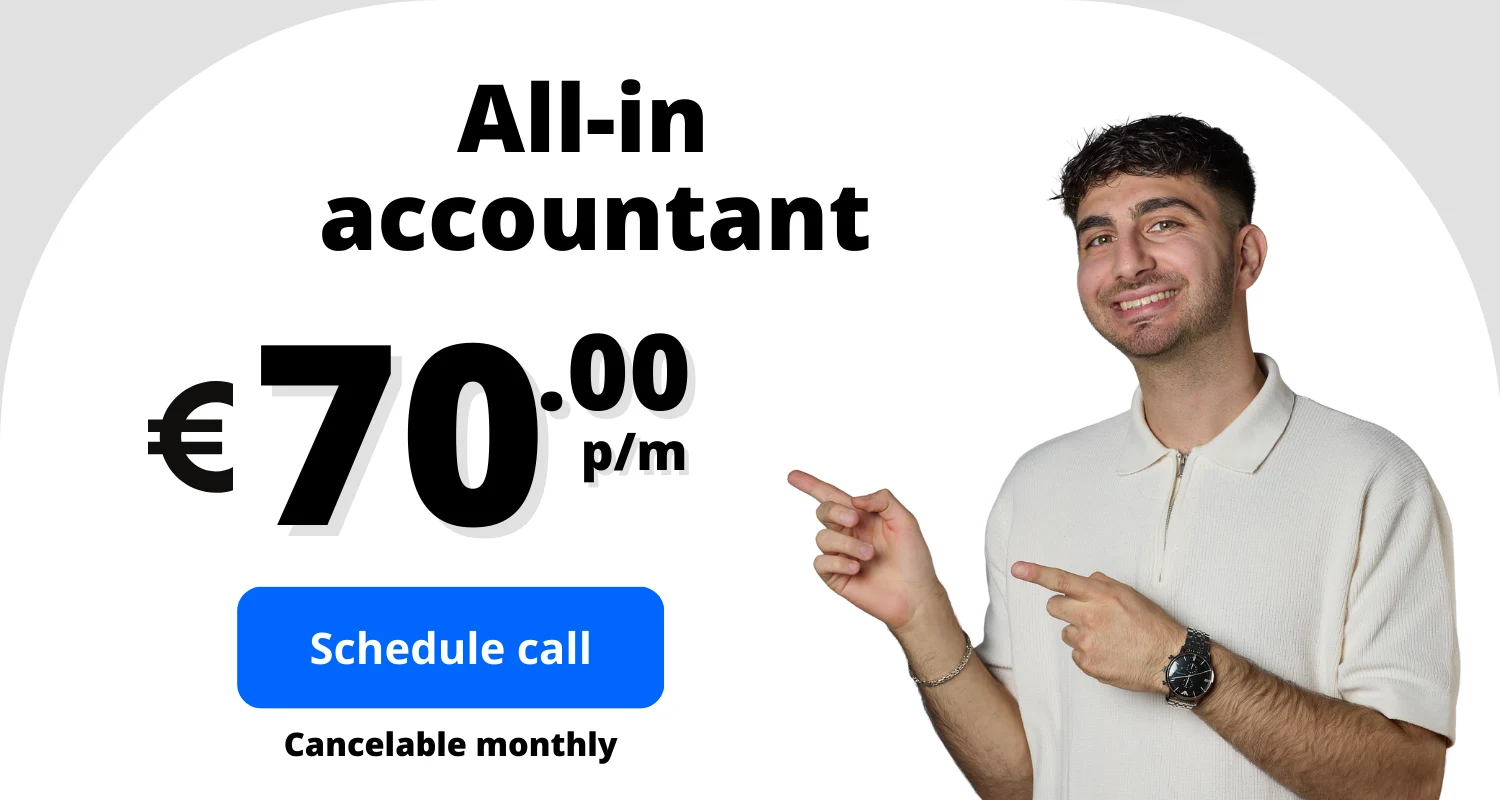What are deductions?
Deductions for self-employed people are amounts you can deduct from your profit or income before the tax authorities calculate how much tax you pay. This reduces your tax base and you pay less tax. Some deductions only apply if you meet the hours criterion of 1,225 hours, such as the self-employed deduction and start-up deduction.
There are also deductions without an hours criterion, such as the SME profit exemption, investment deductions and many ordinary business expenses. There are also personal deductions, such as donations or mortgage interest, which fall outside your business but reduce your overall tax burden.
It is smart to first consider which deductions you can always use, and only then whether you meet the hours criterion to get extra benefits.
Self-employment deduction
If you meet the hour criterion and are an entrepreneur for income tax purposes, you can take advantage of the self-employed deduction. This is a fixed amount that lowers your profits and thus reduces your tax burden. The self-employed deduction is especially interesting in the first years of your business or when your profits are not very high yet. If in any year you fall just below the hour criterion, this deduction is no longer available. Therefore, plan your hours consciously and keep good records.
Start-up deduction
Have you just started as a self-employed person? Then, in addition to the self-employed deduction, you can also make use of the start-up deduction. The conditions are that you have not applied the self-employed deduction more than twice in the past five years and were (partly) not an entrepreneur in that period. If you do not yet earn much profit in your first few years, the start-up deduction can make a big difference: you reduce your taxable profit and keep more money to invest in your business.
SME profit exemption
The SME profit exemption is a deduction without an hours criterion. Every entrepreneur with profits from business, after the entrepreneurial deduction, is allowed to deduct a fixed percentage of the remaining profit. This way, you pay less tax on every euro earned. If you have a loss, the exemption increases that loss, which can affect the loss relief. Take this into account if you expect a less profitable year.
Investment deduction
If you invest in business assets, you can make use of an extra investment deduction. In the sections below, you will read which three forms of this are most interesting for self-employed people.
Small-scale investment deduction (KIA)
The KIA encourages smaller investments. If you invest above the threshold and below the upper limit, you get an extra deduction percentage. Spread investments smartly over several years to stay within the favourable limits. If you sell the asset within five years, a disinvestment addition may follow.
Energy investment allowance (EIA)
The EIA applies to energy-efficient business assets on the Energy List. You get an extra deduction on top of the depreciation. Report your investment on time and check that you meet the technical requirements.
Environmental investment allowance (MIA)
The MIA offers additional deductions for environmentally friendly investments that are made on the Environmental List stand. The percentage depends on the category. Report the investment on time and check whether combination with other schemes, such as the EIA, is allowed.
Co-work deduction
Does your tax partner regularly work in your business, with little or no remuneration, and do you meet the hour criterion? Then you can use the collaborative deduction. The amount of the deduction depends on the number of hours your partner contributes. Record those hours properly; clear records will prevent discussions with the tax authorities afterwards.
Business expenses
All costs you reasonably incur for your business reduce your profits. Think of software, tools, professional literature, insurance, marketing and hired help. If you use something for both business and private use, deduct only the business part. If you make larger purchases that last longer and are above the investment threshold, then book them as investments and write them off, possibly with the KIA, EIA or MIA.
Car costs
If you use your car both privately and for business, it usually counts as private. You may then deduct €0.23 per business kilometre, plus parking costs and tolls. If the car is used for business purposes, the costs are deductible, but an additional taxable benefit or a private correction applies. Which is more advantageous depends on your usage and mileage.
Telephone charges
Business telephone charges are deductible if you use the phone for your business. If you use one phone for both private and business purposes, you may only deduct the business part of the costs. The same applies to home internet: only the part that is demonstrably used for work is deductible. Equipment such as smartphones, laptops and tablets may be purchased on a business basis; if the price is above the investment limit, you can write it off over several years.
Workplace (home)
A work space at home is deductible only if it is independent, with its own entrance and facilities. For most self-employed people, living expenses are not deductible. However, you may include furniture and equipment as business expenses.
Other deductions
In the sections below, you will find deductions that are often forgotten but can make a big difference in your tax return.
WBSO scheme
If you work on research and development (R&D) as an entrepreneur, you can make use of an additional fixed deduction with an R&D declaration. A higher amount applies to starting entrepreneurs. However, it is important that you work enough R&D hours and submit the application on time.
Disability insurance
Premiums for a disability insurance are usually deductible as income expenditure. On the other hand, the benefit is taxed later. Therefore, check your policy carefully and process the premiums consistently in your tax return.
Strike deduction
Do you quit your business and make a cessation profit, for example through sale or capital release? Then you can use the cessation deduction once in a lifetime. This reduces the tax on your profit when you cease your business.
Deductions for owner-occupied property
If you pay mortgage interest for your own home, you may deduct it within the rules of the owner-occupied home scheme. Certain financing costs are also deductible. While this is not an entrepreneurial deduction, it does affect your overall tax burden.
Personal deductions
Personal deductions include partner alimony, specific care expenses and gifts that meet the conditions. These items are not directly linked to your business, but they do reduce your taxable income. As a result, they remain interesting even in years when your profits are lower.
Rate adjustment deductions
If you earn (partly) in the highest tax bracket, many deductions are no longer offset at that high rate, but at a lower flat rate. As a result, every euro of deduction yields less benefit. This applies to the self-employed deduction, SME profit exemption, WBSO, mortgage interest and personal deductions, among others. Keep this in mind when planning: sometimes it is smarter to spread investments or pension contributions over several years.
Tax return tips
Want to file your tax return smoothly and correctly? These practical tips will help you prepare properly and avoid common mistakes when completing your tax return.
Ensure order in your administration: record all your business expenses and keep receipts and invoices carefully.
Use a calculation tool: calculate deductions for self-employed and test scenarios with or without investments or pension contributions.
Keep good records of your hours: This is how you can convincingly demonstrate the hours criterion when asked by the Tax Office.
Plan big purchases smartly: Determine whether investments are better made this year or next year to benefit from the KIA.
Rate your car: Calculate whether private or business use is more fiscally advantageous and record the choice.
Engage an accountant: an experienced adviser avoids mistakes and often sees deductions you miss yourself.
Frequently Asked Questions
What deductions are there for self-employed people?
Important deductions include the self-employed deduction, start-up deduction, co worker deduction, SME profit exemption, investment deduction and business expenses.
What expenses are deductible for self-employed people?
All business expenses, such as software, insurance, marketing and travel costs. Only the business part is deductible in mixed use.
How can I pay less tax as a self-employed person?
Use all deductions, plan investments smartly and calculate your benefit with a tool for deductions zzp.






